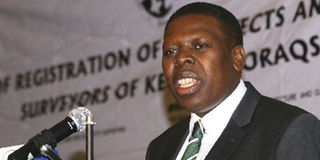Breaking News: Maai Mahiu tragedy: Death toll rises to 45
Wamalwa: TJRC report to address historical injustices

Justice minister Eugene Wamalwa said a report by the truth commission addresses grievances arising from historical injustices raised by the outlawed Mombasa Republican Council among other groups June 8, 2012.
A report by the truth commission addresses grievances arising out of historical injustices raised by the outlawed Mombasa Republican Council among other groups.
The Truth Justice and Reconciliation Commission (TJRC) report contains far-reaching recommendations that forms a strong basis for tackling the inequalities and injustices, Justice minister Eugene Wamalwa has said.
In view of this important task, Mr Wamalwa appealed to Parliament for a time extension to enable the commission wrap up its report.
“We, as a ministry, have asked Parliament to give TJRC three more months for it to come up with its recommendations on how to address historical injustices including those witnessed at the Coast and which the MRC has been citing,” Mr Wamalwa said Friday during the opening of MPs' Forum on Peaceful Elections at Mombasa Continental Resort.
He said the MRC issue was being addressed in Parliament through two committees, which the Speaker has mandated to deal with the matter.
The minister appealed to politicians to stop embracing outlawed groups for political mileage saying such a move was counterproductive and a threat to national security.
The opening session was attended by President Kibaki, Prime Minister Raila Odinga, Vice President Kalonzo Musyoka, Chief Justice Willy Mutunga and House Speaker Kenneth Marende.
The meeting provided a platform for discussion of causes of the post-election violence that followed the bungled 2007 presidential elections and recommended measures taken to prevent a recurrence of the same.
Mr Wamalwa called on presidential candidates to exercise good leadership by respecting national institutions such as the Judiciary.
“It begins with us presidential candidates. We are saying that time has come in this country when we have to embrace a new culture of respect to institutions.
"The institutions need our support but we are the ones who sometimes use barazas and funerals to attack them,” the minister said.
On his part, Internal Security minister George Saitoti said that using lessons learnt from the PEV, the government had taken adequate security measures to ensure the country is not plunged into violence during or after the forthcoming elections.
“After losses and suffering of 2007 Kenyans are worried as to whether there would be a repeat in the coming elections. As leaders we are going to listen to the voice of Kenyans. If we give in to the powers of darkness, and engage in violence, the world will not give us a second chance.”
Prof Saitoti revealed that his Ministry had initiated measures within the police force and provincial administration as a deterrence to any outbreak of election-related violence.
“What we have done is that we have mapped out the entire country. The district intelligence and security committees have identified all the flashpoints and hotspots.
“They have gone much further to involve the people, by conducting advocacy, telling people that time has come to move forward and that that we cannot allow the violence of 2007 recur again.
“Other measures currently in place include peace and reconciliation committees at district levels going down to the locational levels. These are all-embracing and bring together all stakeholders such as faith organisations and business leaders to dialogue on need for different communities to live in peace," he said.
On police preparedness to prevent the violence, Prof Saitoti said new curriculum had been introduced for police training with a component on Human Rights, which makes them more disciplined and responsive to the needs of Kenyans.




